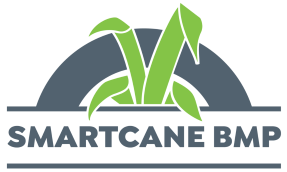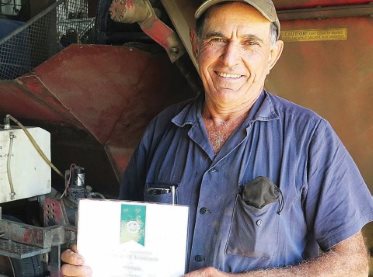It is a year since Tony and Margaret Bugeja, with their son Mark and brother John, achieved their accreditation in the sugar industry’s best management practice program Smartcane BMP. As one of the first growers through accreditation in a module, Tony said from the start that it was crucial for him as a grower that the program had credibility.
“I was one of the first growers to be check-audited when the program was first being rolled out, and they were very thorough,” he said.
Check-audits are carried out by independent environmental/risk management entities on a small number of accredited growers each year. This is to ensure an accredited grower is maintaining record keeping and the BMP standard, usually a year after achieving accreditation. Tony and his family farm around 365ha of irrigated cane land across five farms at Palmyra and Rosella in the Mackay region. He is a third-generation cane farmer and his parents purchased the Palmyra cane land in 1953.
“Keeping good records isn’t new to us, we’ve always kept records,” John says of working with his father.
Keeping good records isn’t new to us, we’ve always kept records.John Begeja
“We use a lot of colour coded maps that show very clearly where our fertiliser and products are going, and our irrigation.”
“We realised early on (in Smartcane BMP) that we’d need to keep more details, but again that wasn’t a big problem because what I didn’t have our agronomist had, so the information could be found fairly easily.”
Tony says he has always maintained that it was ‘no good being green, if you were in the red’.
“The environment today is a big issue, and as a farmer you need a good business structure to ensure you remain viable and profitable, particularly when you are changing management practices,” he said.
Tony also is a Project Catalyst grower working in conjunction with Reef Catchments to continually strive towards improving water quality from agriculture.
“Quite often if you are fine-tuning your practices to be more efficient this does quite often result in environmental benefits – reducing and minimising products while increasing efficiency.”
Tony said he had previously accessed Reef Rescue funding to improve the farm’s environmental sustainability and efficiency. Amongst the equipment purchased, although not all was co-funded, were the zonal rotary hoe, centre pivots, GPS, conversion to 1.8m rows and an upgrade to the planter to convert to variable rate.
“Back when we first moved to GPS, one unit cost $47,000. The farm now has three units resulting in ever-increasing precision,” he said.
“You can’t make these investments unless they give you a return.”
Having accreditation also allows the Bugeja partnership to feel more secure in the fact that they now have the credentials to prove they are a sustainable and responsible cane farming business.
“If you say it (that you have done something on your farm), you have to be able to prove it – and with Smartcane BMP accreditation and our record keeping we can do that.”
Tony said it did take some time to get the bookkeeping and record keeping up to scratch.
“Having said that, we are not doing anything extraordinary and now it is just a part of what we do every day.”
He said it was positive for the industry and the future that the BMP modules had been modified to align with global best management standard Bonsucro.
“The Government is looking over our shoulder, if we do not undertake Smartcane BMP voluntarily, the Government will do it for us. Reef auditors are already here and UNESCO is looking on,” Tony said.
“If I could say anything to a grower who was being negative about the program, I’m advising them to go and talk to other growers who have been through the process.”

